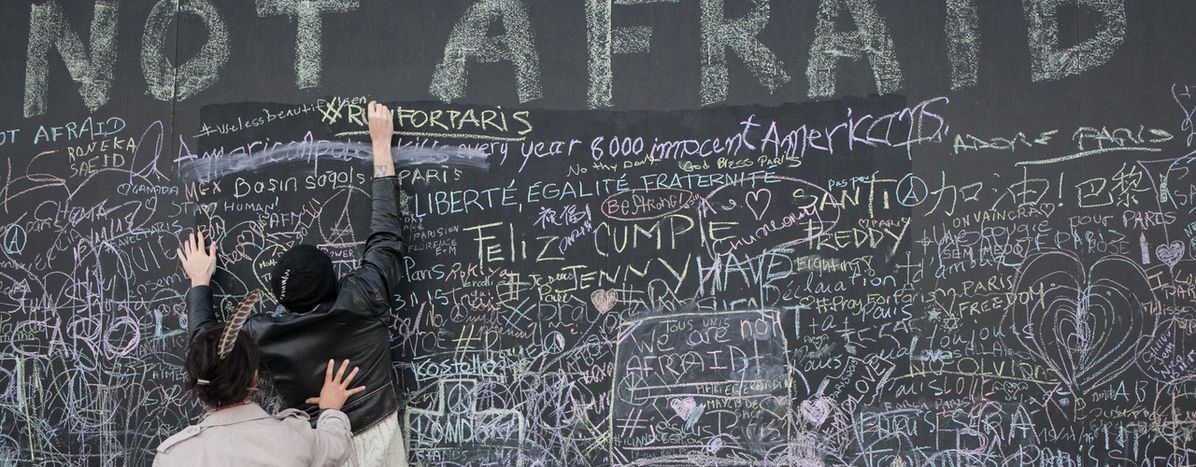
Grief and social media: Home of the holier-than-thou
Published on
Translation by:
Elena FeehanSocial media has made strange bedfellows of terrorism and compassion, yet through it all we grieve on.
These are dark times for France, for Europe, for the whole world.
Each of us endeavours to express our sympathy, shaken by terrorism’s sudden, alarming proximity, and by the impact of the drama that has unfolded.
“Davor fliehen Flüchtlinge,” laments a sign outside the French embassy in Berlin: “This is what refugees are fleeing”. For Europe, the power of Islamic State is now abundantly clear. On German television, a terrorism expert has stated that: “Europeans must now be prepared for a terrorist to simply blow himself up on the underground.”
We know this. We see these acts of cruelty, this thirst for power and this desire to spread fear, the same nightmare that millions of people are currently fleeing. We are spoiled, those of us who live in the EU. We live under fair democracies and, for the most part, in peaceful cohabitation with one another.
Terrorist acts provoke human responses
We see pictures of windows shot to smithereens, we hear the sound of bombs, and we weep at the sight of bodies in the streets.
When we live in a socialised state, events like these serve as a reminder that such horrors are indeed possible. We realise how lucky we are to live in a functioning society.
This is why the many hashtags like #PrayForParis or any of the other expressions of sympathy offered across social media stick in our throats. We write on Facebook, Twitter or Tumblr that our thoughts are with Parisians, with those whose lives were lost and wasted, and with their loved ones. Our thoughts linger, too, over this incomprehensible tragedy.
Helpless and overwhelmed in the face of death and destruction
Next come the cynics: “What about the victims in Beirut/Syria/Libya?” they retort.
Every innocent life lost is a blow, no matter where the victim was from, but it’s no surprise that we are more troubled by terrorism that feels perilously close to our everyday lives than by attacks on the other side of the world. It reminds us that there are organisations out there that are prepared to sacrifice the lives of their members for the purposes of spreading fear. All of this is now happening in our immediate vicinity, formerly seen through rose tinted glasses.
Yet even as we attempt to put our helplessness into words (and in 2015, we have endless platforms on which to do so), a divide forms across social media. These sites may bring people together, but they also place their varying opinions side by side, and the many attempts to show sympathy for the victims in the form of status updates or profile pictures have brought about a new kind of controversy.
Facebook and the Tricolore
As of Saturday, Facebook has been offering its users the opportunity to colour their profile pictures in red, white and blue, and many have chosen to do so. 23 hours after the attacks, I logged into Facebook and the first notification I received was about those on my feed who had used the Tricolore function, even though every one of us knows that a photo draped in the French flag cannot heal Paris’s wounds. Moments later, the next post I saw was about the hypocrisy of Europeans who are more horrified by the loss of French lives than those of victims in Beirut or Syria.
People die every day in this cruel and unfair world, and terrorism on any continent is unthinkable. But while it is human to mourn the death of any man, woman or child, it is also logical to be more affected by horrors right outside our front door. The self-righteous of Facebook contest this, but no one can deal with this level of atrocity with absolute rationality. Our reaction is human, emotional. Many of us have been to Paris, and anyone who has done so can conjure up an image of herself or himself wandering happily along her streets. Those of us who have visited Syria, and can thus do the same for there, are much fewer in number.
We suffer alongside the French; we see their pain, which this year has encompassed the tragedies at Charlie Hebdo and in the kosher supermarket, and now yet another tragedy in their capital city. We react to their suffering because it could just as easily be ours. Paris could just as easily be Vienna, or London.
Ultimately, it does not matter
The dispute over self-expression – over who is more virtuous, more politically correct – is utterly irrelevant. This week, 129 people in France lost their lives to terrorism. Over 40 died in Beirut. In Syria, the death toll continues to defy estimation.
We mourn with those who have lost their loved ones. Innocent people have been killed, or else have had to witness the use of Kalashnikovs in their midst.
Let us tear the masks from the faces of those trying to be clever, and focus on bringing humanity to all these networks, no matter how superficial it may seem – for all of us. After all, we are nothing more than human.
Translated from Selbstgerecht auf Social Media: Wien könnte Paris sein



